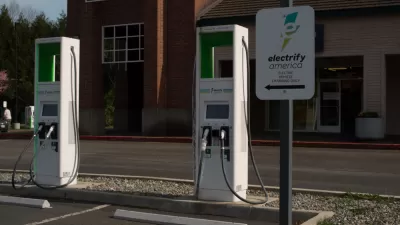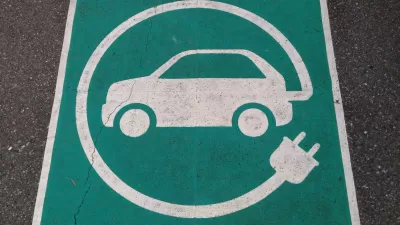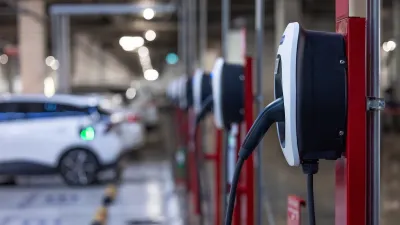More electric vehicles on the road will mean more demand for charging stations where drivers can power up away from home.

"With carmakers and state and federal government entities increasingly looking to combat carbon emissions with electric vehicles, one of the major sticking points to their widespread adoption remains the nation’s undersized and spotty charging infrastructure." As Planetizen previously covered, more private companies are stepping in to fill the gap and position themselves as key players in the growing electric infrastructure industry.
Jamie Lincoln Kitman reports on one such company, Charge, which "is offering a nationwide soup-to-nuts service that provides siting, planning, permitting and construction of E.V. charging stations."
"According to the Energy Department, there are roughly 50,000 (overnight or workday) Level 2 charger locations in service in the United States and Canada, and about 7,000 Level 3 fast charger locations, of which 1,400 are part of Tesla’s supercharging network," far short of the 500,000 proposed by President Biden and the millions needed to provide comprehensive coverage. Kitman writes that "Mr. Fox and Mr. LaNeve anticipate that eight million to 10 million chargers will be installed across the country over the next 15 or so years. They foresee a constantly changing parade of new technologies and a broad array of places where charging stations might be located, including hotels, supermarkets, health clubs and office buildings."
In the article, Charge chief executive Andrew Fox likens EV charging to cell phone coverage. "It’s like if you were trying to use a cellphone to go cross-country 30 years ago. You got expensive charges for roaming, you got dropped calls." Now, coverage is, for the most part, ubiquitous.
FULL STORY: When Electric Cars Rule the Road, They’ll Need Spots to Power Up

Alabama: Trump Terminates Settlements for Black Communities Harmed By Raw Sewage
Trump deemed the landmark civil rights agreement “illegal DEI and environmental justice policy.”

Planetizen Federal Action Tracker
A weekly monitor of how Trump’s orders and actions are impacting planners and planning in America.

The 120 Year Old Tiny Home Villages That Sheltered San Francisco’s Earthquake Refugees
More than a century ago, San Francisco mobilized to house thousands of residents displaced by the 1906 earthquake. Could their strategy offer a model for the present?

In Both Crashes and Crime, Public Transportation is Far Safer than Driving
Contrary to popular assumptions, public transportation has far lower crash and crime rates than automobile travel. For safer communities, improve and encourage transit travel.

Report: Zoning Reforms Should Complement Nashville’s Ambitious Transit Plan
Without reform, restrictive zoning codes will limit the impact of the city’s planned transit expansion and could exclude some of the residents who depend on transit the most.

Judge Orders Release of Frozen IRA, IIJA Funding
The decision is a victory for environmental groups who charged that freezing funds for critical infrastructure and disaster response programs caused “real and irreparable harm” to communities.
Urban Design for Planners 1: Software Tools
This six-course series explores essential urban design concepts using open source software and equips planners with the tools they need to participate fully in the urban design process.
Planning for Universal Design
Learn the tools for implementing Universal Design in planning regulations.
Clanton & Associates, Inc.
Jessamine County Fiscal Court
Institute for Housing and Urban Development Studies (IHS)
City of Grandview
Harvard GSD Executive Education
Toledo-Lucas County Plan Commissions
Salt Lake City
NYU Wagner Graduate School of Public Service





























